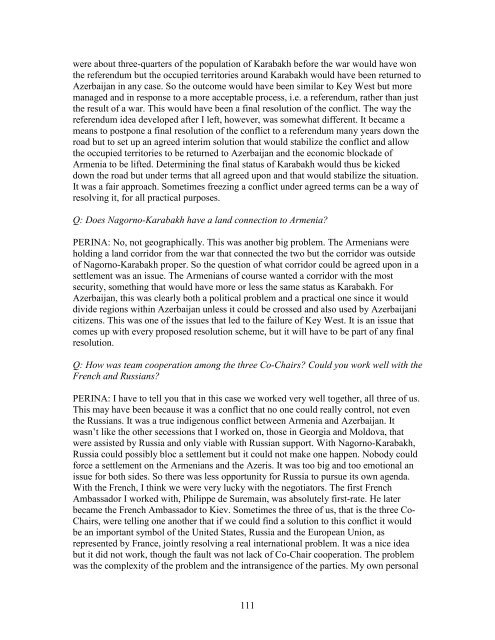ambassador rudolf v. perina - Association for Diplomatic Studies and ...
ambassador rudolf v. perina - Association for Diplomatic Studies and ...
ambassador rudolf v. perina - Association for Diplomatic Studies and ...
You also want an ePaper? Increase the reach of your titles
YUMPU automatically turns print PDFs into web optimized ePapers that Google loves.
were about three-quarters of the population of Karabakh be<strong>for</strong>e the war would have won<br />
the referendum but the occupied territories around Karabakh would have been returned to<br />
Azerbaijan in any case. So the outcome would have been similar to Key West but more<br />
managed <strong>and</strong> in response to a more acceptable process, i.e. a referendum, rather than just<br />
the result of a war. This would have been a final resolution of the conflict. The way the<br />
referendum idea developed after I left, however, was somewhat different. It became a<br />
means to postpone a final resolution of the conflict to a referendum many years down the<br />
road but to set up an agreed interim solution that would stabilize the conflict <strong>and</strong> allow<br />
the occupied territories to be returned to Azerbaijan <strong>and</strong> the economic blockade of<br />
Armenia to be lifted. Determining the final status of Karabakh would thus be kicked<br />
down the road but under terms that all agreed upon <strong>and</strong> that would stabilize the situation.<br />
It was a fair approach. Sometimes freezing a conflict under agreed terms can be a way of<br />
resolving it, <strong>for</strong> all practical purposes.<br />
Q: Does Nagorno-Karabakh have a l<strong>and</strong> connection to Armenia?<br />
PERINA: No, not geographically. This was another big problem. The Armenians were<br />
holding a l<strong>and</strong> corridor from the war that connected the two but the corridor was outside<br />
of Nagorno-Karabakh proper. So the question of what corridor could be agreed upon in a<br />
settlement was an issue. The Armenians of course wanted a corridor with the most<br />
security, something that would have more or less the same status as Karabakh. For<br />
Azerbaijan, this was clearly both a political problem <strong>and</strong> a practical one since it would<br />
divide regions within Azerbaijan unless it could be crossed <strong>and</strong> also used by Azerbaijani<br />
citizens. This was one of the issues that led to the failure of Key West. It is an issue that<br />
comes up with every proposed resolution scheme, but it will have to be part of any final<br />
resolution.<br />
Q: How was team cooperation among the three Co-Chairs? Could you work well with the<br />
French <strong>and</strong> Russians?<br />
PERINA: I have to tell you that in this case we worked very well together, all three of us.<br />
This may have been because it was a conflict that no one could really control, not even<br />
the Russians. It was a true indigenous conflict between Armenia <strong>and</strong> Azerbaijan. It<br />
wasn’t like the other secessions that I worked on, those in Georgia <strong>and</strong> Moldova, that<br />
were assisted by Russia <strong>and</strong> only viable with Russian support. With Nagorno-Karabakh,<br />
Russia could possibly bloc a settlement but it could not make one happen. Nobody could<br />
<strong>for</strong>ce a settlement on the Armenians <strong>and</strong> the Azeris. It was too big <strong>and</strong> too emotional an<br />
issue <strong>for</strong> both sides. So there was less opportunity <strong>for</strong> Russia to pursue its own agenda.<br />
With the French, I think we were very lucky with the negotiators. The first French<br />
Ambassador I worked with, Philippe de Suremain, was absolutely first-rate. He later<br />
became the French Ambassador to Kiev. Sometimes the three of us, that is the three Co-<br />
Chairs, were telling one another that if we could find a solution to this conflict it would<br />
be an important symbol of the United States, Russia <strong>and</strong> the European Union, as<br />
represented by France, jointly resolving a real international problem. It was a nice idea<br />
but it did not work, though the fault was not lack of Co-Chair cooperation. The problem<br />
was the complexity of the problem <strong>and</strong> the intransigence of the parties. My own personal<br />
111
















